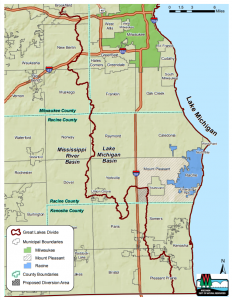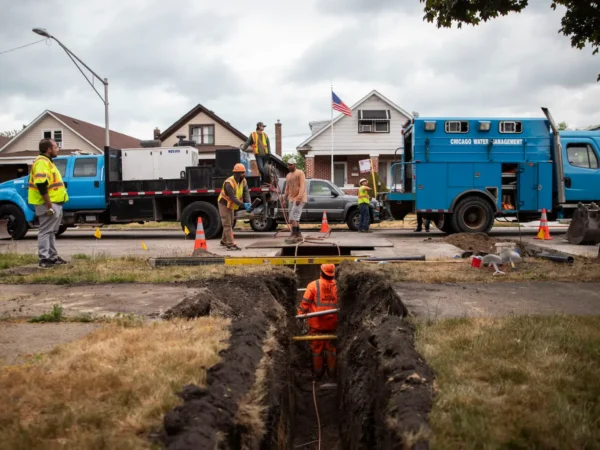
Wisconsin stands by Lake Michigan diversion as tech giant rethinks investment
While Foxconn Technology rethinks its investment in southeast Wisconsin, one thing remains constant: Wisconsin is not wavering in its commitment to divert Lake Michigan water to support a manufacturing operation that may not materialize.
Last week Foxconn announced it was pulling back from a commitment to a manufacturing facility that could bring up to 13,000 jobs to Wisconsin.
The economic environment had changed, and the company could no longer be competitive there, according to various news outlets. The company still had plans to locate in Wisconsin, but not with a major manufacturing facility that would require millions of gallons of water daily.
The move made regional and national headlines but the company quickly reversed course, reportedly after President Trump intervened.
Through it all Wisconsin stands by the Lake Michigan diversion.
“There are no plans to revisit the (Racine) diversion,” Department of Natural Resources spokesperson Andrew Savagian told Great Lakes Now.
The DNR “has not received a request to modify or rescind the diversion approval issued to the city of Racine. The city’s diversion approval remains valid,” Savagian said.
The city of Racine sits on Lake Michigan and would supply water to the proposed Foxconn facility, which is just outside the Great Lakes basin. Wisconsin was able to approve the diversion without permission from the other Great Lakes states based on provisions in the Great Lakes Compact which governs diversions.
Racine Mayor Cory Mason defended the Lake Michigan diversion when it was originally approved by the DNR and last week told the Racine Journal Times that he still welcomes the economic investment Foxconn will bring in spite of the company’s recent wavering. .
In Wisconsin, new DNR director Preston Cole is bringing Todd Ambs back to the department in a senior position. Ambs was instrumental in guiding Wisconsin through the approval process of the Great Lakes Compact between 2005 and 2008 before leaving the agency when Scott Walker became governor.
Ambs declined to comment on the Foxconn diversion saying he will not have official status at the DNR until March 1st.
Environmental groups challenge
A coalition of primarily Wisconsin-based environmental groups lead by Midwest Environmental Advocates (MEA) oppose the Lake Michigan diversion and have mounted a legal challenge to the original approval.
The group says the Great Lakes Compact requires that a diversion be primarily for residential customers, and in the case of the Racine diversion, the primary customer will be Foxconn.
The case is before an administrative law judge with a decision expected later this year.
After Foxconn’s first announcement that is was pulling back from a manufacturing investment, MEA staff attorney Sarah Geers said, “we’re examining DNR’s authority to rescind or modify a diversion approval based on a significant change in circumstances.”
Status quo for new governors
It is unclear what, if any role Great Lakes governors will play in the continuing Foxconn saga. Unlike the Waukesha diversion, governors have no veto authority over the Racine-Foxconn deal.
The Waukesha request was anticipated well before a formal request was made. The Racine-Foxconn diversion opportunity was not anticipated, and the states appeared unready to take on another diversion battle. Some observers questioned if the region was experiencing “Waukesha fatigue.”
The governors asked a few questions and provided comments when the original diversion process started. But coming off a protracted Waukesha fight that spanned nearly a decade, they left it to Wisconsin to resolve.
Jon Allan, who heads Michigan’s Office of the Great Lakes, told Great Lakes Now that concerning Foxconn, he didn’t have a comment other than his office was monitoring it closely.
Allan said Michigan had not received anything from the Compact Council that would alter the Racine diversion Wisconsin approved. The Council is chaired by Indiana Gov. Eric Holcomb and Michigan Gov. Gretchen Whitmer is the vice chair.
“Unless or until that happens, we will proceed as the Council work and Wisconsin informs us,” Allan said.
Allan ran the Office of the Great Lakes under former Gov. Rick Snyder and said he expects to be in the position into March.
Long-time anti-diversion advocate Dave Dempsey said prior to Wisconsin’s approval of the Foxconn diversion that it’s time for the states to conduct a review of the Compact to strengthen its weaknesses.

Sarah Geers, Staff Attorney Midwest Environmental Advocates, Photo by midwestadvocates.org via Gary Wilson
He said the Foxconn approval could “endanger the entire Compact” but he “doesn’t see any interest in that in the foreseeable future.”
Environmental attorney Geers remains resolute.
Great Lakes Now asked her if Lake Michigan water and the Compact had become a pawn in the negotiations between Wisconsin state and local governments and Foxconn.
“Our role is to make sure that doesn’t happen. The diversion of Great Lakes water exclusively for an industrial development is not allowed under the Compact,” Geers said.
“Foxconn’s shifting plans only strengthen our resolve to undo the terrible precedent set by this diversion.”
Foxconn did not respond to a request to comment.







